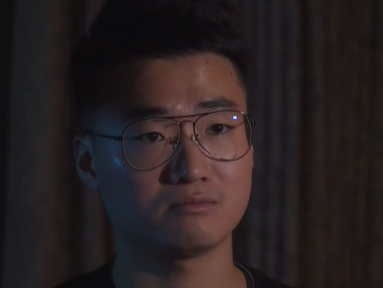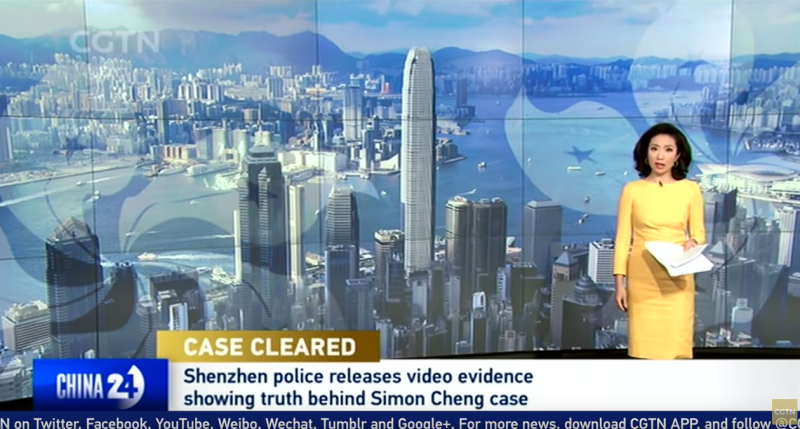
A former employee of the British Consulate in Hong Kong has complained to Ofcom over a confession he claims he was forced to make which was then aired in the UK by the Chinese state broadcaster’s international arm.
Simon Cheng was detained in Shenzhen, mainland China, for two weeks in August after a one-day visit and claims he was beaten and interrogated by police after he attempted to return to Hong Kong.
Chinese police claim Cheng was placed in administrative detention for allegedly soliciting prostitutes, allegations that he denies. Cheng said police had in fact quizzed him about the UK’s role in the Hong Kong “riots”.
On 21 November China Global Television Network’s China 24 programme reported the police claim as fact and aired a clip of Cheng’s allegedly forced confession, during which a newsreader speaks over him to say he “acknowledged his violation of the law”.
Hong Kong citizen Cheng, who said he has been forced to go into hiding over threats from Chinese authorities, has complained to Ofcom about the programme in a letter published online by non-profit organisation Safeguard Defenders.
He claimed the programme breached various sections of the Broadcasting Code, including in relation to privacy, fairness, harm and offence, crime and disorder, and impartiality and accuracy.
Ofcom confirmed it has received the complaint and is assessing it “as a priority”.
Although Cheng admitted he had been tasked by the British consulate with gathering information about the ongoing pro-democracy protests in Hong Kong, he said this was routine diplomatic procedure.
Cheng told Ofcom: “The CGTN broadcast infringed my privacy and presented falsehoods. CGTN did not seek consent from me.
“And importantly, at the time of recording, I was not able to give consent as I was under duress and distress, undergoing torture and held incommunicado at a secret location.”
The programme used footage of Cheng in a lobby and corridor which it claimed was “evidence of him doing it [soliciting prostitutes] three times in half a month”.
But Cheng said: “Nothing in that surveillance footage shows me, or indicates in any way me, soliciting prostitutes. All it shows is a lobby and a corridor. Yet, CGTN states all these things as facts.”
He went on: “The broadcaster states that I am guilty of soliciting prostitutes, despite no evidence to this effect having been presented by the police, other than an alleged ‘confession’ film recorded by the police themselves while I was held incommunicado and under duress at an unknown location, in solitary confinement, and without legal counsel.
“Broadcasting such a ‘confession’ has no journalistic merit and is not the behaviour of a real media outlet.
“CGTN did not solicit comments, inputs or responses. Nor was I in any way approached to give my consent to this defamatory and inaccurate broadcast.”
Ofcom is already investigating CGTN for allegedly broadcasting a forced confession made by former journalist Peter Humphrey and his wife. Humphrey has said the footage was “cut and pasted” with additional material and “distorted and mistranslated”.
According to Safeguard Defenders, other Ofcom complaints have since been filed against CGTN over broadcasts of forced TV confessions relating to the detained Swedish publisher Gui Minhai.

CGTN’s China 24 segment about Simon Cheng on 21 November. Picture: CGTN/Screenshot
Cheng claimed the CGTN broadcast about him was only produced to counter “international outcry” over his treatment, coming just one day after he spoke to the BBC and claimed he had been tortured.
He added that CGTN was “well aware” the recording of him was extracted “under extreme duress” but that it did not explain this to viewers, instead presenting it “as though it were filmed with my will and consent”.
“The broadcast is entirely unjust and unfair,” he went on.
Cheng said CGTN had unfairly cut together the footage of him from several separate clips, adding that it was “not a straight-through or genuine interview but an on-camera interrogation shot in separate takes”.
“The broadcast is made for the purpose of stating that I have committed a crime, despite no evidence and no court judgment being presented,” Cheng said.
“It is also for the purpose of inciting hatred against me, with the aim of reducing my credibility. This is the real editorial purpose of the program broadcast by CGTN. In this CGTN broadcast, there is no, absolutely no, challenge to the information which is presented as fact.”
CGTN has not responded to a request for comment.
Picture: Reuters/Willy Kurniawan
Email pged@pressgazette.co.uk to point out mistakes, provide story tips or send in a letter for publication on our "Letters Page" blog

